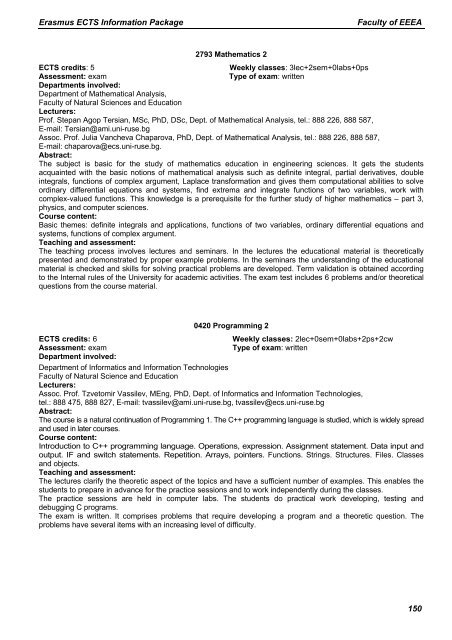Erasmus ECTS Information Package
Erasmus ECTS Information Package
Erasmus ECTS Information Package
Create successful ePaper yourself
Turn your PDF publications into a flip-book with our unique Google optimized e-Paper software.
<strong>Erasmus</strong> <strong>ECTS</strong> <strong>Information</strong> <strong>Package</strong><br />
Faculty of EEEA<br />
2793 Mathematics 2<br />
<strong>ECTS</strong> credits: 5<br />
Weekly classes: 3lec+2sem+0labs+0ps<br />
Assessment: exam<br />
Type of exam: written<br />
Departments involved:<br />
Department of Mathematical Analysis,<br />
Faculty of Natural Sciences and Education<br />
Lecturers:<br />
Prof. Stepan Agop Tersian, MSc, PhD, DSc, Dept. of Mathematical Analysis, tel.: 888 226, 888 587,<br />
E-mail: Tersian@ami.uni-ruse.bg<br />
Assoc. Prof. Julia Vancheva Chaparova, PhD, Dept. of Mathematical Analysis, tel.: 888 226, 888 587,<br />
E-mail: chaparova@ecs.uni-ruse.bg.<br />
Abstract:<br />
The subject is basic for the study of mathematics education in engineering sciences. It gets the students<br />
acquainted with the basic notions of mathematical analysis such as definite integral, partial derivatives, double<br />
integrals, functions of complex argument, Laplace transformation and gives them computational abilities to solve<br />
ordinary differential equations and systems, find extrema and integrate functions of two variables, work with<br />
complex-valued functions. This knowledge is a prerequisite for the further study of higher mathematics – part 3,<br />
physics, and computer sciences.<br />
Course content:<br />
Basic themes: definite integrals and applications, functions of two variables, ordinary differential equations and<br />
systems, functions of complex argument.<br />
Teaching and assessment:<br />
The teaching process involves lectures and seminars. In the lectures the educational material is theoretically<br />
presented and demonstrated by proper example problems. In the seminars the understanding of the educational<br />
material is checked and skills for solving practical problems are developed. Term validation is obtained according<br />
to the Internal rules of the University for academic activities. The exam test includes 6 problems and/or theoretical<br />
questions from the course material.<br />
0420 Programming 2<br />
ЕCTS credits: 6<br />
Weekly classes: 2lec+0sem+0labs+2ps+2cw<br />
Assessment: exam<br />
Type of exam: written<br />
Department involved:<br />
Department of Informatics and <strong>Information</strong> Technologies<br />
Faculty of Natural Science and Education<br />
Lecturers:<br />
Assoc. Prof. Tzvetomir Vassilev, MEng, PhD, Dept. of Informatics and <strong>Information</strong> Technologies,<br />
tel.: 888 475, 888 827, E-mail: tvassilev@ami.uni-ruse.bg, tvassilev@ecs.uni-ruse.bg<br />
Abstract:<br />
The course is a natural continuation of Programming 1. The C++ programming language is studied, which is widely spread<br />
and used in later courses.<br />
Course content:<br />
Introduction to C++ programming language. Operations, expression. Assignment statement. Data input and<br />
output. IF and switch statements. Repetition. Arrays, pointers. Functions. Strings. Structures. Files. Classes<br />
and objects.<br />
Teaching and assessment:<br />
The lectures clarify the theoretic aspect of the topics and have a sufficient number of examples. This enables the<br />
students to prepare in advance for the practice sessions and to work independently during the classes.<br />
The practice sessions are held in computer labs. The students do practical work developing, testing and<br />
debugging C programs.<br />
The exam is written. It comprises problems that require developing a program and a theoretic question. The<br />
problems have several items with an increasing level of difficulty.<br />
150
















